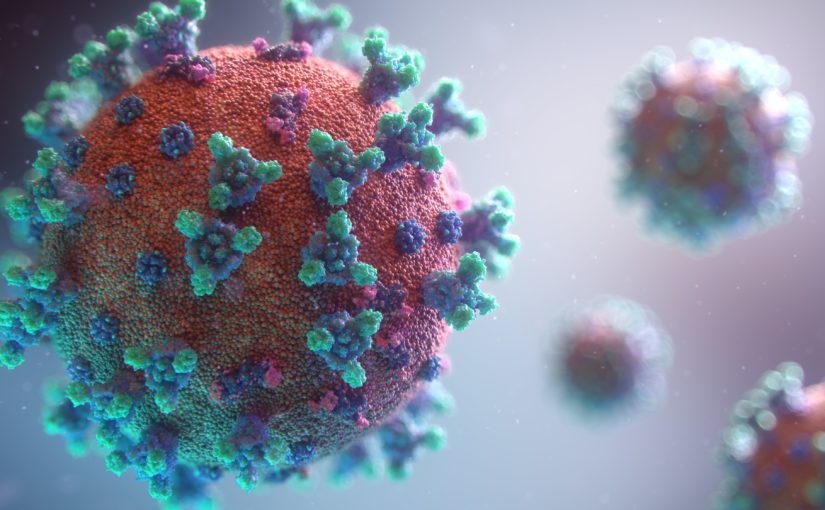“What the world needs now are better stories.” (Jurriaan Kamp, 2006)
There is so much uncertainty and concern surrounding the novel coronavirus. However, despite the challenges caused by COVID-19 particularly in the Global South, people also see positive changes in their communities. We asked people from nine different countries to tell us their stories of hope of which the following is an account.
Solidarity for Farmers in India, Mexico and Sierra Leone
Food is one of our most fundamental needs. And while some of us crave for our favourite restaurant to reopen again after the lockdown, others do not know how to get something to eat. In times of COVID-19, food supply has become a major challenge for governments, communities and families. Especially in the Global South, smallholder farmers have difficulties selling their products due to lockdowns when several markets have been closed or are subjected to restrictions and supply chains broke down. Nevertheless, there is also good news: Some farmers got creative and created projects that might continue with and after the coronavirus pandemic and could change food supply chains in the future.
In the state of Maharashtra in India, for example, the farmers of Satara introduced a new community model of farm-to-market supply, which turned out to be a lucrative business model: Thanks to a supportive local administration that issued permits very quickly, the farmers now form their own community, avoiding the hassle that often comes with middlemen. Their success has encouraged them to plan to expand the project beyond the coronavirus crisis, altering the connection farmers and the sale of their produce.
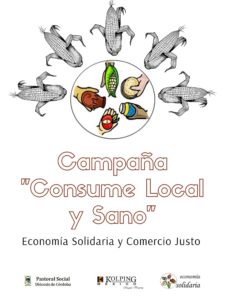 Another creative way to tackle the challenges was found by Kolping Veracruz, an organisation that is part of the Kolping-Society of Mexico. The campaign “Consume locally and healthy” is an initiative created in the Veracruz Regional Association of Kolping. Its aim is to use social media to motivate people to buy the products of small producers, to promote the services of small entrepreneurs and to create alternatives for the sensitisation and activation of solidarity-based economy against the background of this difficult health and economic crisis. The campaign has connected with faces of the farmers and they will have the chance to talk about their life realities, which have changed due to COVID-19. With the virtual campaign, a market through Facebook and WhatsApp has been created. It has reached more than 1,500 people and generated over 500 interactions. Producers reported that they have received orders on a local level but also from a supra-regional level, which helps them to sell in this lockdown economy.
Another creative way to tackle the challenges was found by Kolping Veracruz, an organisation that is part of the Kolping-Society of Mexico. The campaign “Consume locally and healthy” is an initiative created in the Veracruz Regional Association of Kolping. Its aim is to use social media to motivate people to buy the products of small producers, to promote the services of small entrepreneurs and to create alternatives for the sensitisation and activation of solidarity-based economy against the background of this difficult health and economic crisis. The campaign has connected with faces of the farmers and they will have the chance to talk about their life realities, which have changed due to COVID-19. With the virtual campaign, a market through Facebook and WhatsApp has been created. It has reached more than 1,500 people and generated over 500 interactions. Producers reported that they have received orders on a local level but also from a supra-regional level, which helps them to sell in this lockdown economy.
In Sierra Leone, where complete lockdowns and curfews are frequent, food prices have risen due to the restricted possibilities for farmers to sell their products. Rice is one of the country’s staple foods and is often cooked with a stew based on palm oil. Close to the capital Freetown lives a farmer, who, after years of work on a palm oil plantation, had stocked many litters for later supply. Unable to sell his stock during the current crisis, as many people are lacking money to buy food, he decided to give out half of his palm oil for free in order to stabilize and reduce the high market price.
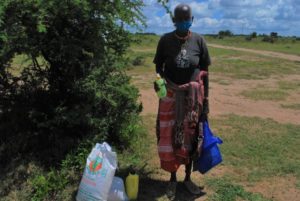 Also pastoralist communities and communities in rural settings are suffering from the lack of food supply at local markets in Kenya. Therefore, the organisation IMPACT (short for: Indigenous Movement for Peace Advancement and Conflict Transformation) continues to respond to COVID-19 by distributing assorted food packages to vulnerable families from across 12 different villages in Samburu East Sub-County. In total, 350 needy households were targeted cutting across the 12 villages in which 2,100 people benefited directly. Nyarwai Sapuru, who is among these direct beneficiaries, lives alone with her three grandchildren after their mother passed away. Nyarwai says that “it has been really hard” caring for the children during these tough times. In the past, it was normal for them to have only one meal a day, but “now I am assured that my grandchildren and I will have something to eat for the next coming days,” she exclaims with delight.
Also pastoralist communities and communities in rural settings are suffering from the lack of food supply at local markets in Kenya. Therefore, the organisation IMPACT (short for: Indigenous Movement for Peace Advancement and Conflict Transformation) continues to respond to COVID-19 by distributing assorted food packages to vulnerable families from across 12 different villages in Samburu East Sub-County. In total, 350 needy households were targeted cutting across the 12 villages in which 2,100 people benefited directly. Nyarwai Sapuru, who is among these direct beneficiaries, lives alone with her three grandchildren after their mother passed away. Nyarwai says that “it has been really hard” caring for the children during these tough times. In the past, it was normal for them to have only one meal a day, but “now I am assured that my grandchildren and I will have something to eat for the next coming days,” she exclaims with delight.
Raising Awareness on Public Health and Job Creations due to COVID-19 in Burkina Faso, Ghana and Malawi
Washing hands and living in a clean environment is very important for the fight against the coronavirus. Especially in settings where there is no running water, a simple task like washing hands can become a challenge. When the virus reached Burkina Faso, for example, there was not only a lack of toilet paper in some places, but also one of an entire infrastructure: In the province of Sanguie, there are no resuscitation facilities, hardly any testing facilities and an extremely patchy hygiene system. In response to a call for help from the mayor of Reo, the capital of the province, the German association “Mudawane Wape Yila”, founded by a Burkinabé and which has been working with people for a better future for three years, organised a fundraising campaign. Within one week they collected €1,500. The money was used to buy not only hygiene materials, such as face masks and hand guards, but also food for people to survive the quarantine. This example shows how ready people are to help even without knowing each other.
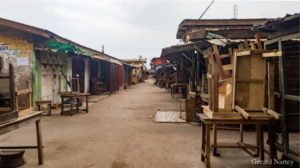 With the aim for cleaner cities and disinfect streets to fight the virus, there are also other positive effects: In bigger cities in Ghana, gutters are very narrow and full of plastics that hinder water from flowing. This makes a perfect breeding ground for mosquitoes that could then increasingly spread malaria. In the course of fighting the coronavirus, a lot of gutters have been cleaned by the city authorities in Accra, the capital of Ghana, which has helped significantly in decreasing malaria infections. Gabriel Kumalebo states: “From my personal viewpoint, I think because of the coronavirus, cleanliness is ensured in recent times because the environment is clean and we no longer experience stuff like malaria.”
With the aim for cleaner cities and disinfect streets to fight the virus, there are also other positive effects: In bigger cities in Ghana, gutters are very narrow and full of plastics that hinder water from flowing. This makes a perfect breeding ground for mosquitoes that could then increasingly spread malaria. In the course of fighting the coronavirus, a lot of gutters have been cleaned by the city authorities in Accra, the capital of Ghana, which has helped significantly in decreasing malaria infections. Gabriel Kumalebo states: “From my personal viewpoint, I think because of the coronavirus, cleanliness is ensured in recent times because the environment is clean and we no longer experience stuff like malaria.”
Malawi is one of the poorest countries in the world and there, too, the virus has led to job increases in certain sectors. Although a lot of people lost their jobs, new opportunities have come up: Health personnel that have been trained some years ago, but were not employed due to the underfunded health system, have now been asked to come back to work.
How COVID-19 Unites Families and Neighbours in Liberia, Mexico, Colombia and Panama
Some people struggle more than others due to the coronavirus. Especially in low-income countries, governments can often not provide enough support, and it becomes more important for families and neighbours to help each other. Several stories highlight how effective responses can be found in seeking shared responsibility and solidarity. In Liberia, a country that suffered from Ebola a few years ago, “COVID-19 has built relationships that were dying”, says Joe Lelee Sloan. A lot of people leave their villages and families behind to work in cities and those who stay in the cities with their families, spend a lot of time at work or commuting. People are now asked to stay at home and have returned to their villages and families. Thus, the virus is bringing many families back together and they now spend more time with each other. Also in the cities directly, kids see their parents more often and they can actually kiss them goodnight and feel the happiness in their homes.
These positive effects are not only happening in families but also in neighbourhoods. For example, a group of volunteers in a village in Mexico has been blocking two roads leading to the village for weeks now and prevented outsiders from coming in. They stand there day and night, and everybody who wants to enter the village needs proof of living there. As a result, the village has no reported cases of coronavirus infections.
Another positive effect is the distribution of food and small need items in neighbourhoods. In Antioquia, a department in North Western Colombia, a sign was placed in a public area saying: “I count on you, you count on me, if you need, take, if you have leftovers, donate”, serving as a reminder for solidarity and neighbourhood assistance.
However, not in every country it has even been possible to go out and get food from around the neighbourhood. Panama, for instance, has very strict regulations on the periods of time when people are allowed to go out. A lot of security guards face the problem of finding grocery stores closed once they are done with their shift. Many of them have children and need to bring food home for them, too. So a group of neighbours in Panama City got together and started to buy food baskets for people working late shifts in the security sector every two weeks.
There are a lot of uncertainties due to COVID-19, but still there is hope, there is joy and people are finding creative ways to tackle new challenges and uncertainties. Communities around the world stand together to support each other. There will be a “new normal” after COVID-19 and we hope that these acts of solidarity and mutual support will be part of it.
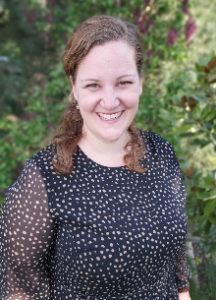
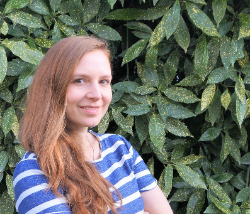
The team of authors, Samantha Ruppel and Alena Sander, would like to thank everybody who contributed to this article. Also many thanks to the members of the KFIBS Africa Research Unit (see: https://kfibs.org/forschungsgruppen/regionale-forschungsgruppen/afrika/) for their review process.
(Hinweis: Der vorliegende Blog-Beitrag gibt nicht zwingend die Meinung des KFIBS e. V. wieder.)
(Bildnachweis für Beitragsbild: Photo by Fusion Medical Animation on Unsplash)

